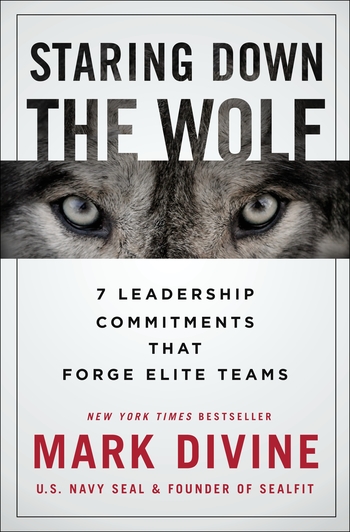What it Takes to Be a Virtual Leader
Mark Divine, author of Staring Down the Wolf, joined QDT for a quick chat about what it takes to be a leader while work and school remain virtual. Here are his seven commitments you need to apply to your life to change the world.
Mark Divine is a former Navy SEAL and has trained thousands of aspiring Navy SEALs. He owns and runs the SEALFIT Training Center in San Diego, California where he trains thousands of professional athletes, military professionals, SWAT, First Responders, SOF candidates, and everyday people looking to build strength and character. The QDT team conducted a short interview with him about his book Staring Down the Wolf (St. Martins Press, 2020).
So much of workplace life is remote right now. What are your key tips for supervisors to help them continue to motivate and lead their team over a screen?
I have found that a key to leading a remote team effectively with online video conferencing is to lead them in certain activities that take them out of their comfort zone and lead to deep connection. This creates great engagement and personal growth from what was formerly a boring and routine digital meeting.
Buy Now

Examples can include the Box Breathing practice that we do with Unbeatable Mind students (which is discussed in the book) or a physical activity like 50-00 air squats done together or each teammate sharing something vulnerable such as how they are handling the stress of the shelter in place orders. These experiences are out of the normal flow of business discussions and planning, but the time spent doing them creates a much deeper connection than if the participants were actually physically in the same room and not doing them. This is how a team can grow “vertically”—developing their character, compassion, and connection—while also working on the “horizontal” skills required to competently perform their duties at the organization.
Can the principles discussed in Staring Down the Wolf (courage, trust, respect, growth, excellence, resiliency, and alignment) be applied to students and teachers who have had their education dramatically shifted? How can students prove to be leaders in a Zoom classroom and inspire their classmates and peers?
These principles are universal and applicable to all individuals and all situations, including students and teachers.
The foundation for outstanding student teams will be built upon the first three commitments of Courage, Trust, and Respect. A student can lead with courage by taking the risk to be authentic with their views, rather than hiding behind the latest social trends and memes. Also, they can demonstrate that they stand for something more than their own egoic needs, such as the well-being of the other students. This courageous behavior creates the conditions for trust, which is further strengthened through transparent communications with humility, as well as radical follow-through on commitments to the other students.
To develop these character traits [courage, trust, and respect] as a student is the best preparation for the leadership they will need to bring to the volatile, uncertain, complex, and ambiguous “real world” they will soon enter.
That level of trust leads to deep respect, often lacking in any team not committed to growth. Respect begets even more integrity in behavior (such as no gossiping). Authentic, connecting relationships and an attitude of service spring forth amongst the entire team as a natural human response to these positive emergent qualities. To develop these character traits as a student is the best preparation for the leadership they will need to bring to the volatile, uncertain, complex, and ambiguous “real world” they will soon enter.
What was one of the most surprising things you learned after you retired from the SEALs and began a career as an entrepreneur?
I was surprised as heck to learn that leading in the SEALs was far easier than leading my entrepreneurial organizations. That is because the SEALs attract, select, and train elite-level potential teammates and hold them accountable to a stunningly powerful code of conduct. Until I began to replicate this for my companies, Unbeatable and SEALFIT, I failed to build anything close to an elite team. And without exceptional teamwork, it is impossible to grow any organization that can make a positive impact beyond the bottom line … especially at a global level.
Leaders and teams who are committed to growing their potential, performance, connection, and service, can change the world.
What do you most hope readers learn or take away from Staring Down the Wolf?
That leaders and teams who are committed to growing their potential, performance, connection, and service, can change the world. The seven commitments introduced in the book are a road map to deep, integrated growth that allows teams to see, and then courageously take on “change the world missions”—and make them a reality.
You May Also Like…





